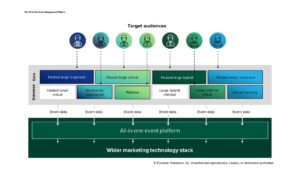Too many organizations treat their event technology as a tactical rather than strategic asset, with different teams selecting and deploying solutions in silos. This leads to wasted resources, overlapping capabilities, and data silos. Consolidating on to a single all-in-one event management platform (EMP) solves these challenges and also helps teams deliver more personalized and digital-centric audience experiences.
Forrester defines an all-in-one EMP as:
A platform used to successfully plan and execute in-person, virtual, and hybrid B2B events. Its capabilities extend across pre-event planning and setup (e.g., event promotion and marketing, inviting and registering attendees), at-event execution (e.g., content delivery and attendee engagement), and post-event analysis and follow-up (e.g., post-event communications and event data analysis). An all-in-one EMP offers integrations into marketing automation platforms (MAPs), CRM, and other sales and marketing technologies.

When selecting an all-in-one event management platform vendor, leaders should ask themselves four key questions:
- Does the vendor support my current and planned event mix? When evaluating vendors, conduct a high-level audit of event activity to understand the current mix of event use cases. Look to an all-in-one platform to deliver at least 80% of this activity and reduce spend through vendor consolidation. As part of this exercise, consider the benefits of moving to a more centralized model and establishing an event center of excellence, with the all-in-one platform as the core solution.
- Will a vendor integrate into my wider marketing technology stack? Most vendors offer some level of integration into core MAP and CRM systems, but not all of them will offer the same level of integration and professional services support. When evaluating vendors, work in close partnership with revenue operations. Identify those vendors that offer the deepest integrations into the solutions already in your technology stack and, in the process, maximize the value of your event data.
- What level of security and data privacy does the vendor offer? The majority of all-in-one vendors have policies in place for compliant data collection, but not all will offer the same level of security. Take the time to understand how personal data is managed and encrypted, and check whether vendors are certified/compliant with such standards as SOC 2, ISO 27001, GDPR, CCPA, and the EU-US Privacy Shield Framework.
- What does the vendor’s AI roadmap look like? Exploited effectively, AI will improve pre-event productivity and efficiency, deliver more personalized and inclusive at-event experiences, and help maximize post-event ROI through improved data analysis and content repurposing. And while current AI uptake is low, that will change over the next 18 months. Take the time to understand vendor AI capabilities and their future roadmap.
Forrester clients can read the new report, The All-In-One Event Management Platforms Landscape, Q3 2024, to understand the value they should expect from a technology provider, learn how the vendors differ, and get help with vendor selection based on required functionality and event use cases. They can also request a guidance session to go into any aspect of event technology selection and deployment in more detail.








